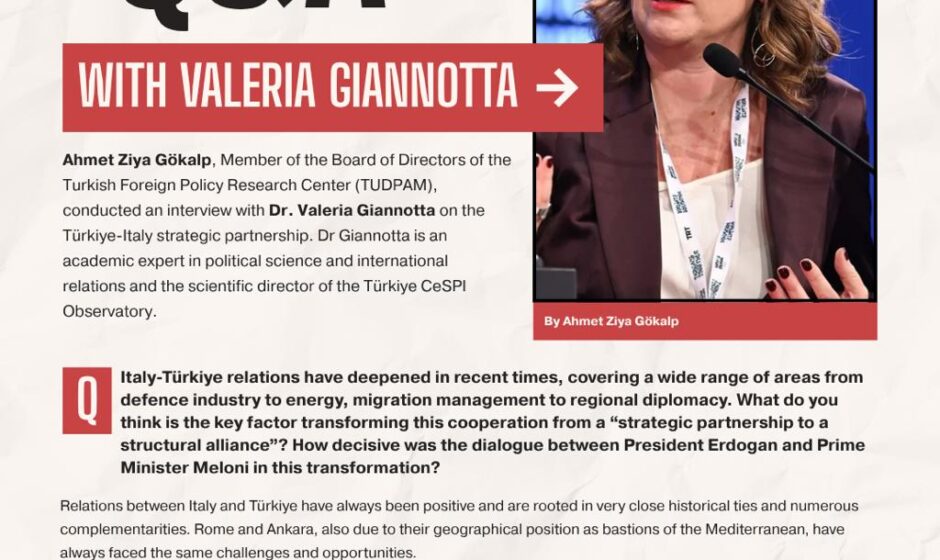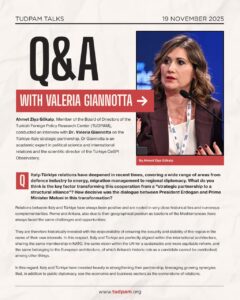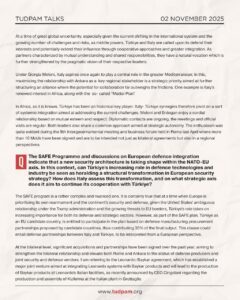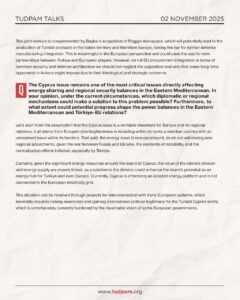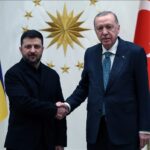Ahmet Ziya Gokalp, conducted an interview with Dr. Valeria Giannotta on the Türkiye-Italy strategic partnership. Dr Giannotta is an academic expert in political science and international relations and the scientific director of the Türkiye CeSPI Observatory.
Ahmet Ziya Gokalp: Italy-Türkiye relations have deepened in recent times, covering a wide range of areas from defence industry to energy, migration management to regional diplomacy. What do you think is the key factor transforming this cooperation from a “strategic partnership to a structural alliance”? How decisive was the dialogue between President Erdogan and Prime Minister Meloni in this transformation?
Dr. Valeria Giannotta: Relations between Italy and Türkiye have always been positive and are rooted in very close historical ties and numerous complementarities. Rome and Ankara, also due to their geographical position as bastions of the Mediterranean, have always faced the same challenges and opportunities. They are therefore historically invested with the responsibility of ensuring the security and stability of the region in the name of their own interests. In this respect, Italy and Türkiye are perfectly aligned within the international architecture, sharing the same membership in NATO, the same vision within the UN for a sustainable and more equitable reform, and the same belonging to the European architecture, of which Ankara’s historic role as a candidate cannot be overlooked, among other things. In this regard, Italy and Türkiye have invested heavily in strengthening their partnership, leveraging growing synergies that, in addition to public diplomacy, see the economic and business sectors as the cornerstone of relations. At a time of great global uncertainty, especially given the current shifting in the international system and the growing number of challenges and risks, as middle powers, Türkiye and Italy are called upon to defend their interests and potentially extend their influence through cooperative approaches and greater integration. As partners characterized by mutual understanding and shared responsibilities, they have a natural vocation which is further strengthened by the pragmatic vision of their respective leaders. Under Giorgia Meloni, Italy aspires once again to play a central role in the greater Mediterranean; in this, maximizing the relationship with Ankara as a key regional stakeholder is a strategic priority aimed at further structuring an alliance where the potential for collaboration far outweighs the frictions. One example is Italy’s renewed interest in Africa, along with the so- called “Mattei Plan”. In Africa, as it is known, Türkiye has been an historical key player. Italy- Türkiye synergies therefore pivot on a sort of systemic integration aimed at addressing the current challenges. Meloni and Erdogan enjoy a cordial relationship based on mutual esteem and respect. Diplomatic contacts are ongoing, the meetings and official visits are regular. Both leaders also share a common approach aimed at strategic autonomy. The enthusiasm was quite evident during the 9th Intergovernamental meeting and business forum held in Rome last April where more than 10 MoUs have been signed and are to be intended not just as bilateral agreements but also in a regional perspectives.
Ahmet Ziya Gokalp: The SAFE Programme and discussions on European defence integration indicate that a new security architecture is taking shape within the NATO-EU axis. In this context, can Türkiye’s increasing role in defence technologies and industry be seen as heralding a structural transformation in European security strategy? How does Italy assess this transformation, and on what strategic axis does it aim to continue its cooperation with Türkiye?
Dr. Valeria Giannotta: The SAFE program is a rather complex and nuanced one. It is certainly true that at a time when Europe is prioritizing its own rearmament and the continent’s security and defense, given the United States’ ambiguous relationship under the Trump administration and the growing threats to EU borders, Türkiye’s role takes on increasing importance for both its defense and strategic sectors. However, as part of the SAFE plan, Türkiye as an EU candidate country, is entitled to participate in the plan based on defense manufacturing procurement partnerships proposed by candidate countries, thus contributing 35% of the final output. This clause could entail defense partnerships between Italy and Türkiye, to be interpreted from a European perspective. At the bilateral level, significant acquisitions and partnerships have been signed over the past year, aiming to strengthen the bilateral relationship and elevate both Rome and Ankara to the status of defense producers and joint security and defense vendors. I am referring to the Leonardo-Baykar agreement, which has established a major joint venture aimed at integrating Leonardo systems with Baykar products and will lead to the production of Baykar products at Leonardo’s Italian facilities, as recently announced by CEO Cingolani regarding the production and assembly of Kizilelma at the Italian plant in Grottaglie. This joint venture is complemented by Baykar’s acquisition of Piaggio Aerospace, which will potentially lead to the production of Turkish products in the Italian territory and therefore Europe, raising the bar for furrher defense manufacturing integration. This is meaningful in the European perspective and could pave the way for new partnerships between Türkiye and European players. However, on full EU procurement integration in terms of common security and defense architecture we should not neglect the opposition and veto that some long-time opponents in Ankara might impose due to their ideological and strategic concerns.
Ahmet Ziya Gokalp: Türkiye and Italy have long played complementary roles in Libya. However, the balance of power in the region remains fragile. What diplomatic or security mechanisms need to be institutionalised for the Rome-Ankara axis to have a lasting impact on Libya’s political stability and energy security?
Dr. Valeria Giannotta: I believe the mechanism launched on August 1st in Istanbul is significant. During the meeting between Meloni, Erdogan, and Dibeba, the priority was the stabilization of Libya, and several consultation mechanisms at various levels were implemented. Unfortunately, Libya is affected by extensive critical issues and security and stability problems requiring the implementation of various processes, both bottom-up and top-down, which may be facilitated and mediated by key players such as Türkiye and Italy. I believe the mechanism launched on August 1st in Istanbul is significant. Türkiye enjoys a certain legitimacy gained from the MoU signed in 2019 and is actively mediating between the conflicting parties. Like Türkiye, Italy shares several interests in Libya, from energy to the fight against illegal immigration and human trafficking, which inevitably depend on the stabilization of the country. In this regard, the agreement and relationship with Ankara serve as a driving force and a link to contain the crises. It is useful to recall, for example, the agreement signed at the bilateral level aiming at strengthening the cooperation with Türkiye, and Ankara’s commitment to containing migratory flows towards Italy. Rome and Ankara share efforts in implementing different mechanisms to stabilize Libya along with cooperative agreements with the Government of National Accord (GNA) where Italy focuses much on immigration control and training, while Italy and Türkiye are implementing different mechanisms to stabilize Libya, with Italy focusing on cooperation agreements with the GNA for immigration control and training, while Türkiye has a broader engagement, including military agreements with the GNA, political support to various factions, resumption of trade relations and mediation between local authorities.
Ahmet Ziya Gokalp: The Cyprus issue remains one of the most critical issues directly affecting energy sharing and regional security balances in the Eastern Mediterranean. In your opinion, under the current circumstances, which diplomatic or regional mechanisms could make a solution to this problem possible? Furthermore, to what extent could potential progress shape the power balances in the Eastern Mediterranean and Türkiye-EU relations?
Dr. Valeria Giannotta: Let’s start from the assumption that the Cyprus issue is a veritable stalemate for Europe and its regional relations; it all stems from Europe’s shortsightedness in including within its ranks a member country with an unresolved issue within its borders. That said, the energy issue is now paramount, as we are witnessing new regional adjustments, given the war between Russia and Ukraine, the elements of instability, and the normalization efforts initiated, especially by Türkiye. Certainly, given the significant energy resources around the island of Cyprus, the issue of the island’s division and energy supply are closely linked, as a solution to the division could enhance the island’s potential as an energy hub for Türkiye and even Europe. Currently, Cyprus is effectively an isolated energy platform and is not connected to the European electricity grid. This situation can be resolved through projects for interconnection with trans-European systems, which inevitably requires raising awareness and gaining international political legitimacy for the Turkish Cypriot entity, which is unfortunately currently burdened by the maximalist vision of some European governments.


